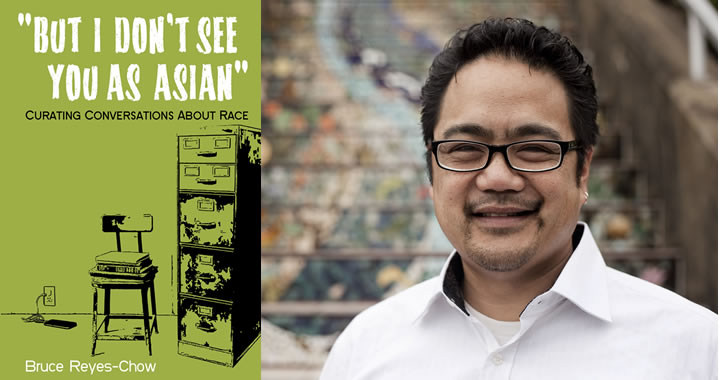Bruce Reyes-Chow is the author of But I Don’t See You as Asian: Curating Conversations About Race.
Who is this book written for?
Everyone?
While I hope this book will speak to a broad range of folks, as I wrote this I was really thinking about young adults as they transitioned out of high school life into adulthood be that college or some other path. So often this is the time when young folks leave home, head to college or move to a new city and often find themselves interacting a diversity of people unknown to them before. Where there was familiarity and some relationships before because of geography and history, these new places force them to now navigate new complexities of race, culture, nationality, economics, sexuality, etc. I think it is at these times when so many instances of unintentional offense occur and it is my hope that this book could be one way for folks to get a head start on developing better ways to interact.
The second group that I believe this would be a helpful book are book groups in church, community group or among friends. In my writing I try be remain accessible without being too academic and heady or confrontational and provocative. Other writers occupy that writing style much better than I, so what I hoped to create was a conversational feel where friends could leverage their trust and share stories, laugh a bit and take a few steps into what can be such a difficult topic to address. Ultimately, because I assume a posture of openness and eagerness by most folks who are willing to read the book, I hope to facilite meaningful conversations that honor their committment to entering the conversation in the first place.
In the end, for anyone, individual or group, who reads this book my hope is that by reading and engaging the content they will shift their understanding of the words they have used, the reactions they have received and how future interactions might be changed.
Why must we, as individuals, a community, and a nation, talk about race?
If we have learned nothing else from recent current events like the Paula Deen controversy or the George Zimmerman verdict, it is that race is still a source of great tension, anger and anxiety in the United States. And while some people believe that if we just stop talking about race, it will go away, I simply and respectfully reject that idea as a course of action for society. I do understand that maybe in the short term, NOT talking about issues of race might feel better and avoid immediate conflict, but over the long haul, like any relationship between two people or that of a community, left unaddressed, conflict will manifest itself in emotionally destructive and violent ways.
More importantly, I believe that we must talk about race, not only to have relationship free of destructive behavior, but because the possibilities for humanity to understand itself and grow more fully into God’s created and complex people is too beautiful to pass up. There have been too many moments in my life where I have seen people of difference (race, gender, economics, age, sexuality, etc.) discover, if not only a brief moment, a sense of the Body of Christ, that embodies diversity as a gift and a necessity and not something to be discarded or denied.
Race in all places and contexts can add to a more fully understanding of the world, but we will only get there if we commit to keep talking about the pitfalls and the possibilities that these conversations can can bring about.
Have Obama’s first four years in office helped or hurt race relations?
While I think folks had an unrealistic view of Obama and what his administration could accomplish in many areas, overall I believe that race relations are better in that folks have begun to air some of the frustrations that have been building up. Obama has given two powerful speeches on race that only a person of color could give and, while some feel that he has helped to create division, he has given voice to some communities that have not felt heard before. This increased influence and visibility of people of color has then been perceived and felt as if some power or access has been taken away from the White community. And while I feel for those perceiving shifts in power, as I mention in my book about stats for college acceptance, political representation and corporate leadership, there has been little real shift on a large scale.
So yes, while we are certainly is a difficult time now, because I believe we have to deal with all of these questions if we are going to move forward as a country and society, we must tackle these things head on. In the end though, politicians and public figures can only help move the conversation only so far. At some point, we all – in our schools, families, churches and places of work – must be willing to have these conversations at a deeply personal level. When we risk this, I trust we will be profoundly changed as individuals and a country.
Read reviews, an excerpt, and find out more about But I Don’t See You as Asian: Curating Conversations About Race in the Red Letter Book Club


